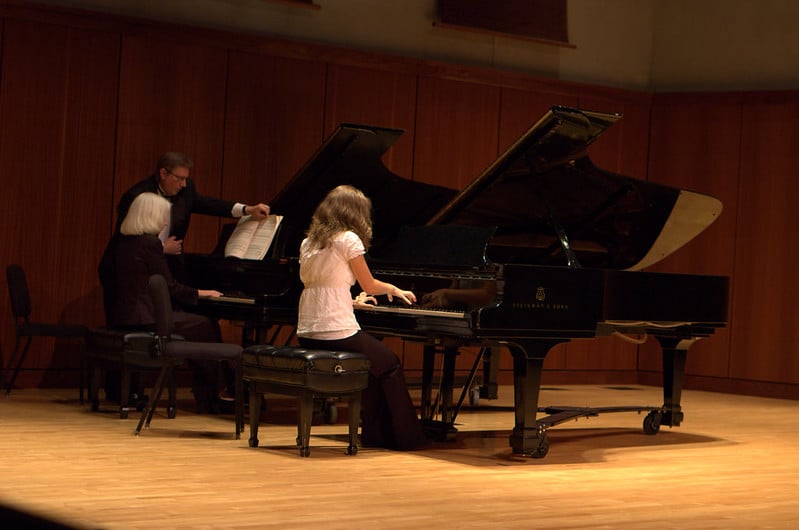
Musicologists are music scholars who study and explore the different ways that the art of music is connected to a variety of areas such as philosophy, aesthetics, politics, sociology, neuropsychology, geography and others.
Apart from approaching music through different angles, musicologists also delve into analyses of the structure, compositional elements, aesthetics, techniques and other theoretical elements, for a wide range of musical creations.
What Does A Musicologist Do?
While most work as music teachers at conservatories or universities, musicologists prefer to see music through the lens of a social science, freed from the constrains of a more “shallow” theoretical approach.
For example, ethnomusicologists study music in its cultural context, whereas cognitive musicologists investigate the different ways music is processed in the human brain.
Historical musicology is a wide and diverse subsection of musicology that examines music in its historical existence, undertaking archival and biographical research, analyzing performative elements, or exploring the societal role of music.
Professors of music spend the most of their time in research, teaching at universities, and publishing academic papers in journals and scientific books. Others might work at libraries, official cultural establishments such as Music Halls or Operas, museums, and archives.
A rising sector of musicology in the past years is forensic musicology, where musicologist provide analyses or appear in court as expert witnesses in copyright infringement lawsuits or working with firms that develop audio recognition software and music recommendation apps.
Musicologists also provide professional advice on film and tv projects.
Musicological fields
Musicology is divided into several fields, ranging from music theory to comparative musicology, which examines music from various civilizations.
Many universities offer musicology degrees, and many musicologists are also talented musicians, actively working as professional performers or composers.
Musicology as a coherent science actually began in the 1800s, when various persons produced research on music. Previously, music magazines concentrated on reproducing scores.
These studies began to investigate aspects of the history of music, looking at its cultural context and social influence. Early musicologists also began to investigate music theory, investigating the roles of different scientific fields in musical expression.
Critical musicology frequently draws significantly on musicology, since a critic with deep understanding of the era and genre they are studying, clearly add significant value to their research.
Some anthropologists and archaeologists study musicology as well, in order to apply their expertise to the civilizations they research.
A historical musicologist may investigate how various types of music developed, when new instruments became popular, and how music has affected societies throughout history.
The branch of musicology that grew out in the latter part of the 20th century is popular musicology, a scientific field that combine disciplines ranging from gender studies to sociology.
Popular musicology, which differs from pop music studies, can provide interesting insights about subcultures such as the hip-hop movement or the techno genre. Like ethnomusicologists, these musicologists examine the art of music within its cultural context.
A musicologist may intertwine to his studies elements from technical theory, such as form in melody, or algebra.
Mathematical analysis of music is pretty intriguing since math is the building block for music; mathematical principles define which sounds are accessible or agreeable to the ear.
Scientists may be interested in music in the form of acoustics, sound engineering, as far as cognitive functions taking place during exposure to musical stimuli.
In the past two decades, informatics is a rising field that is gaining growing interest in musicological studies.
Ethnomusicologists are those who specialize in music from various cultures. Ethnomusicology is a subject of study that has been rapidly expanding and diverting since its early milestone works in the start of the 20th century.
It can also tell when colonial influences first entered music and how different native musical elements where affected.
Ethnomusicological study often takes place in the field, recording and observing folk music practices, traditional ceremonies, and musical instrument creation, artisanship, and knowledge, as well as literal structure, poetics and semantics in lyrics and folktales.
Becoming a Musicologist
An undergraduate degree in music is the first step toward becoming a musicologist. Undergraduate students should plan on taking music lessons and may wish to look into different internship options in the field.
This degree sets the groundwork for graduate studies. A student interested in becoming a musicologist should research multiple schools to learn more about their offerings and the diverse approaches in the field.
It is also important for music institutions to be open to society, and to host events such as open-houses to inform the public and especially aspiring musicologists about the studies they offer.
A post-graduate degree in musicology is required for those who desire to work as a musicologist.
This usually necessitates the creation of a study subject for a master’s thesis, either theoretical, or combined with performative practices, and/or a graduate dissertation.
With the right educational credentials, one may start a career as a musicologist in their scope of focus. A more “focused” degree is required for someone interested in ethnomusicology.
Students interested in studying the evolution of popular music, on the other hand, should choose a school that aligns with the subject.
Most schools follow a similar processing on the acceptance of aspiring students, taking into consideration exam scores, as well as recommendations and a strong motivational letter.
Candidates that are shortlisted are contacted for interviews or auditions. They are invited to the school or university to meet academics, partake in an audition or interview, and present their field of interest, dreams, goals and demonstrate their research subjects.
A master’s degree can widely broaden the horizons and career opportunities for someone aspiring to be a musicologist, although a PhD may be preferable for those seeking a career in research or in the academia, aiming to gain more publishing credits while working with renowned scientists of the area.
Such certification may be useful on job applications where professional credentials are required.
More education and experience might be beneficial when graduates apply for open academic and research positions in academia and in other contexts, such as music halls, operas, or even record labels or music software.



